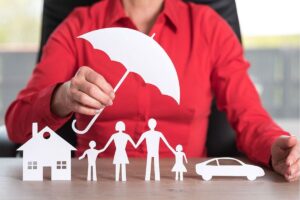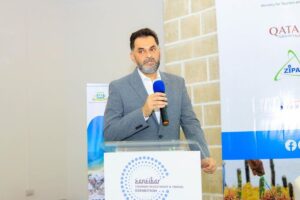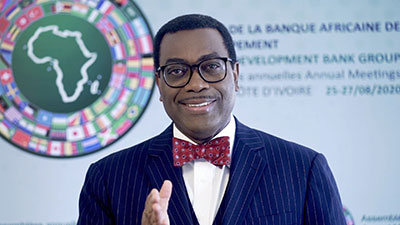Your Excellencies, Ambassadors
Your Excellencies, Honorable Ministers
Executive Directors of the African Development Bank
Senior Management and Staff of the Bank
Leaders and members of Civil Society Organizations
Distinguished ladies and gentlemen
Good morning, everyone!
I am delighted to welcome you to the 2022 Civil Society Forum.
The theme of the 2022 Civil Society Forum: Engaging Civil Society for Climate Resilience and Just Energy Transition, is timely.
Climate change is devastating the economies of Africa. At the 2nd Ministerial on COP 27 at the recently held UN General Assembly in New York, I made it clear that “Africa is suffering, Africa is choking, Africa is in economic distress from the impact of climate change that it did not cause”.
Africa loses $7-15 billion annually from the nefarious effects of climate change, an amount that is projected to rise to $50 billion a year by 2030. African countries will need on average $125 billion annually between 2020-2030 to adapt to climate change.
The African Development Bank is leading the charge on climate financing for Africa. Together with the Global Center on Adaptation we launched the Africa Adaptation Acceleration Program, to mobilize $25 billion for Africa.
We are addressing the needs of the 37 low-income countries and fragile states in Africa that depend on the resources of the African Development Fund, but which are the most vulnerable to climate change. The ADF countries need $600 billion to tackle climate change by 2030, yet do not get climate finance to help them cope with the deluge of climate change impacts on their peoples, communities, and economies.
That is why the African Development Fund is opening a Climate Action Window in the ADF16 replenishment to mobilize up to $13 billion in resources for climate finance for these countries.
The Climate Action Window of the ADF will support 20 million farmers to have access to climate-smart agricultural technologies, support 20 million farmers and pastoralists to have weather-indexed insurance, revamp 1 million hectares of degraded lands, provide 9.6 million people with renewable energy, and provide 840 million cubic meters of water storage.
We will need you, the civil society organizations, to strongly advocate for and support the ADF16 replenishment, as it holds great promise for supporting the most vulnerable in the face of climate change devastations.
The video we just watched beautifully summarizes the African Development Bank’s continued commitment to working with civil society. The African Development Bank is strongly convinced that engaging with civil society is critical for inclusive and sustainable development that truly improves the lives of our people.
That is why right at the start of my first term as President of the bank in 2015, I established its Civil Society, Community Engagement and Social Innovation Division within our Gender, Women and Civil Society Department.
The six unshakable commitments I made during the 2020 Civil Society Forum are as follows:
- Strengthen the institutional capacity of Civil Society Organizations.
- Support the work of Civil Society Organization’s advocacy.
- Strengthen community-level engagement on projects.
- Support Civil Society Organizations to help accelerate access to finance for women.
- Strengthen social and environmental safeguards
- Strengthen engagement with civil society organizations on anti-corruption and governance.
I committed to these because I know that the ambitious goals that we have set to achieve for Africa can only be achieved by putting people at the center of all that we do. I have always maintained that when I think of the African Development Bank, what is most important to me is the “Development” part. That is our mission. Therefore, working with communities, the youth, the women, the private sector, and non-state actors such as the civil society is an integral part of how we reach people, and how we are accountable to people.
The African Development Bank is unique; we do not just lend to Africa; we know Africa; we are based in Africa; and we are the only multilateral financial institution with a mandate for Africa.
We are Africa’s solutions’ Bank.
Seven years ago, I laid out our vision as a Bank to accelerate the development of Africa – the High 5s: to light up and power Africa; feed Africa; industrialize Africa; integrate Africa; and improve the quality of life of the people of Africa. Within five years, the High 5s have impacted on the lives of 335 million people.
The Senegambia Bridge today links Senegal and Gambia for the first time, facilitating movement and trade. The Kazungula Bridge connects Namibia with Botswana and Zambia and has reduced transit time from 14 days to just one hour. The Addis Ababa to Nairobi transport corridor, a $1 billion investment by the Bank, soon to be completed, will expand trade between Ethiopia and Kenya by 400%.
The $20 billion Desert-to-Power project in the Sahel will provide electricity for 250 million people and turn the Sahel zone into the largest solar zone in the world.
Even as we are proud of the progress being made, we realize that the challenges facing Africa and its people remain immense. We are not deterred by the challenges. Our task and responsibility are to take them on, and to make sure that the needs of Africa are prioritized as the world copes with multiple challenges.
To support Africa during the Covid pandemic, the Bank launched a Covid 19 Crisis Response Facility of up to $10 billion. We also launched a $3 billion Fight Covid 19 social bond on the global capital markets, the largest social bond ever in world history. Our support provided countries with resources to meet immediate needs for medical supplies, vaccines, as well as social protection for over 28 million people.
To cushion Africa from the effects of the Russia-Ukraine war, the Bank launched a $1.5 billion emergency food production facility. The facility will support 20 million farmers with access to improved seeds and fertilizers to produce 38 million metric tons of food, worth $12 billion. We will avoid a food crisis in Africa. Within 45 days of the launch of the facility, the Bank had approved $1.13 billion in support of 24 countries. That is who we are: a very responsive Bank!
I am pleased to note that civil society organizations were included by the Bank in our support to the countries. The CSOs were engaged in consultations on Program-Based Operations and their contributions on enhancing accountability and inclusive governance, including for example, in Namibia, Kenya and Botswana. CSOs were included in the Zimbabwe institutional support for governance and public finance management project, where we went even further to include a specific line item dedicated for the Parliament to have direct engagement with key CSOs on budget allocation, accountability on public spending, debt contracting and inclusive governance and growth.
We carefully assess our engagements with the civil society, learning from our work and experiences and ever seeking to improve.
In 2020, the Independent Development Evaluation Unit of the Bank completed an evaluation of the Bank’s civil society engagements over the period 2012-2019. The evaluation reiterated the importance of the Bank’s engagement with civil society organizations in ensuring inclusive and participatory growth and development in Africa. The evaluation recommended need for enhanced work with and support of civil society organizations to add value to the mandate of the Bank; and the need to engage them more in policy dialogue at country and regional levels.
Here at the African Development Bank, our slogan is “promise made, promise kept”. Under my leadership and direction, I tasked the Bank to make clear commitments to CSOs, to ensure full accountability. At the CSO Forum on November 26, 2020, I called for clear actions, with outcomes that are measurable in the Bank’s engagement with the civil society organizations. I wanted to see the CSOs on the platform sharing their views, how they are working with the Bank, and what we can do to further improve our engagements.
I am pleased that significant progress has been made across all the agreed areas. On strengthening the institutional capacity of civil society organizations, the Bank provided grants to three civil society organizations: AVSI Foundation, with $782,802 for support for green energy for youth and women in Uganda and Kenya; ICEI – Instituto Cooperazione Economica Internazionale, with $596,283, to support climate resilient agriculture in the degraded marine and coastal Zambezia; and Zenab for Women Development in Sudan, with $304,066, to support building climate resilience for youth and women.
To train and build CSOs capacity on electricity regulatory issues, the Bank supported the Africa Center for Energy Policy and West Africa Civil Society Institute to enhance the capacity of CSOs on regulatory issues.
To support the climate agenda for Africa ahead of the COP 27, the Bank has so far organized 5 civil society regional forums in 2021 and established an African Development Bank-Civil Society Coalition on the road to COP 27.
The Bank has prioritized the inputs of civil society organizations in its work in a significant way. Civil society organizations engagement was integrated into the development of 39 Country Strategy Papers, including 12 since the beginning of the year, allowing them to influence and shape the directions of countries. I am pleased that over 20 projects at the Bank have had civil society participation in their development.
And the Bank has actively engaged with civil society organizations on strengthening compliance with social and environmental safeguards on all Bank-financed projects.
You all can be proud of us as your partner on transparency. The African Development Bank was ranked this year as the Most Transparent Institution in the World by Publish What You Fund for our work on public sector operations.
The Bank’s new 2021-2025 Governance strategy focuses specifically on civil society engagement to further improve transparency and accountability.
Your work as civil society organizations will continue to be supported and promoted by the African Development Bank.
The Bank is increasingly also showcasing the work of the civil society organizations, with the publication of the Voice of Citizens in Africa Newsletter since 2019, which showcases the work of the Bank with civil society. We have just completed a civil society video with a multimedia firm that will further showcase the work of the civil society with the African Development Bank.
As we look towards COP 27, the voices of the civil society out of Africa should be on the need for developed countries to meet their $100 billion per year commitment for climate finance.
Your voices should be loud in support of the African Development Fund (ADF) 16th replenishment.
Your voices should be loud in support of the Climate Action Window of the African Development Fund.
Together, let us continue to advance Africa’s needs.
Be the “Vuvuzelas” of Africa on climate change.
That is our responsibility, that is our duty, that is our obligation,
To ensure that Africa’s needs are not ignored.
Let’s match forward, together to COP 27 in Sharm El Sheikh.
I therefore declare open the 2022 Civil Society Forum.
Thank you very much.
Source: afdb.org
Share this news
This Years Most Read News Stories

The reason internet speeds in Tanzania still lag behind
Vodacom Tanzania was placed 16th at 17. ’08 Mbps, while Airtel Tanzania was ranked 18th available on 12. 89 Mbps.Continue Reading

Tanzanian insurance firms upbeat after first quarter business growth
Total gross written premiums for the insurance industry have increased by 13.68 percent in the first quarter of 2024, with small and medium-sized companies showing higher growthContinue Reading

Zanzibar’s tourism body chairman Rahim Bhaloo resigns
Bhaloo, who is also Chairman of the Zanzibar Commission for Tourism (ZCT), cited pressing family issues as the reason for his departure.Continue Reading











